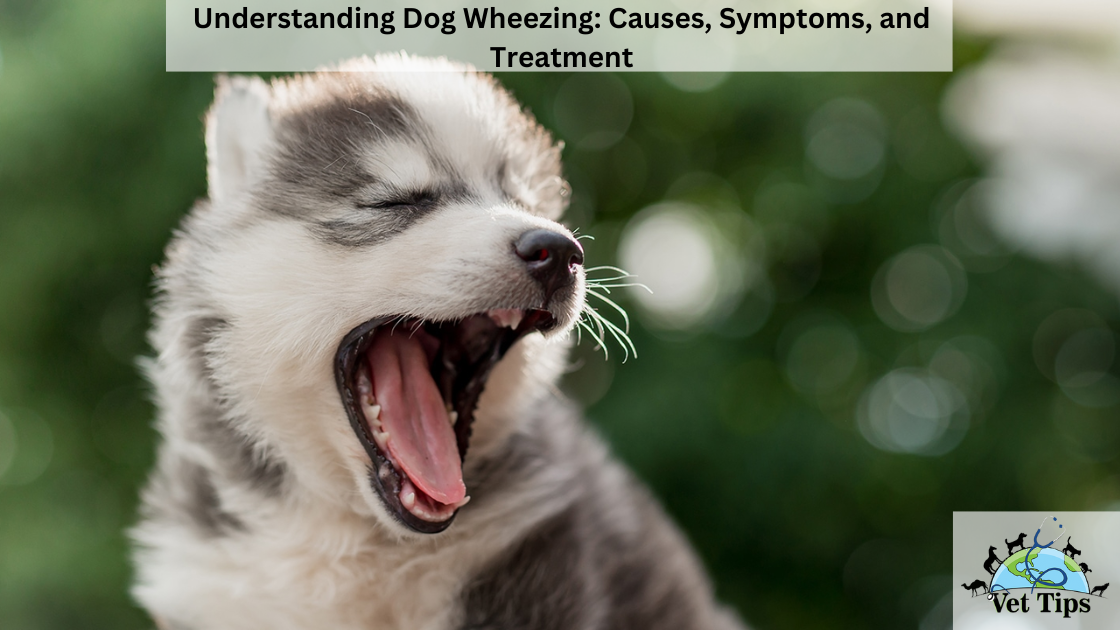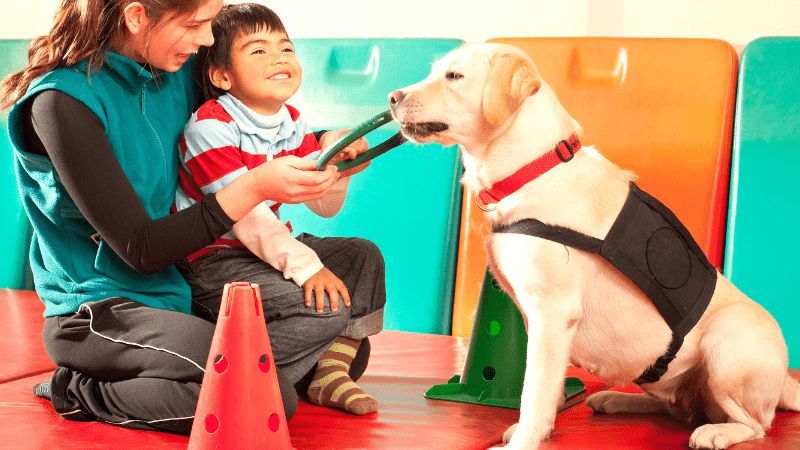Wheezing in dogs is something that pet owners should be concerned about since it might be an indication of more serious health issues. This article examines the causes of dog wheezing, as well as its symptoms, and discusses various treatments for the condition. We hope to shed light on this subject by looking at instances taken from real life and approaching it in a manner that is conversational. Our target audience consists of dog enthusiasts and owners.
Causes of Dog Wheezing
Allergies and Environmental Factors
In most cases, allergies or exposure to a variety of irritants in the dog’s surroundings are to blame for wheezing in dogs. Allergic responses in dogs can be triggered by a wide variety of substances, including pollen, dust mites, mold, and even cigarette smoke, which can cause wheezing and difficulty breathing.
Respiratory Infections
Wheezing is another symptom that can be caused by respiratory illnesses in dogs, such as kennel cough or pneumonia. These infections can cause inflammation of the airways, which can result in coughing and wheezing as the body attempts to clear the respiratory passageways of mucus and other debris.
Tracheal Collapse
A disorder known as tracheal collapse is more likely to occur in some dog breeds than in others, particularly in smaller breeds like Chihuahuas and Pomeranians. Wheezing noises are the consequence of a condition that happens when the cartilage rings in the trachea become brittle and weaken. This results in a partial blockage of the airway.
Symptoms and Diagnosis
Sounds Like Wheezing
The characteristic wheezing sound that occurs when the dog is breathing is the most noticeable sign of wheezing in dogs. Depending on what’s triggering this sound in the first place, it might be anything from a high-pitched whistling to a low-pitched rattling.
Coughing and Gagging
It is not uncommon for wheezing to be accompanied by a persistent cough and even the odd gag. It’s possible that dogs will cough in an effort to clear their airways, but this behavior can sometimes make the wheezing worse.
Labored Breathing
In severe cases, dogs may exhibit labored breathing, characterized by increased effort while breathing. This requires quick medical treatment as it can be stressful for both the dog and the owner, and they both need it.

Treatment Options
Veterinary Consultation
It is imperative that you seek the advice of a veterinarian if your dog has a recurrent wheezing problem. They are able to discover the underlying reason for the wheezing by carrying out a comprehensive examination of the patient, which may include X-rays and other diagnostic procedures.
Medication and Management
The treatment varies significantly depending on the underlying reason of the wheezing. Antihistamines might be used to treat allergic reactions, but antibiotics would be necessary to treat respiratory infections. In the event that the trachea collapses, it is essential to maintain a healthy weight and stay away from irritants.
Lifestyle Adjustments
If your dog’s wheezing is caused by environmental factors, modifying his living space may be helpful in treating the condition. Wheezing is a condition that can be mitigated by maintaining a clean and smoke-free living environment.
Comparative Analysis: Breeds and Wheezing
The propensity for wheezing might vary from breed to breed of dog owing to anatomical and genetic variances. brachycephalic obstructive airway syndrome (BOAS), also known as brachycephalic obstructive airway syndrome, is a condition that can lead to wheezing. This condition is more common in dogs of smaller breeds, such as Bulldogs and Boston Terriers.
FAQs
Can I treat my dog’s wheezing at home?
There is a possibility that minor episodes of wheezing brought on by transient irritants will go away on their own. If, on the other hand, the wheezing continues or gets worse, it is best to get a professional diagnosis and treatment from a veterinarian as soon as possible.
Is it safe to assume that wheezing in a dog usually indicates a major health problem?
Certainly not in every case. The symptoms of wheezing can have a variety of origins, from allergic reactions to infectious diseases. It is vital to acquire a professional evaluation in order to rule out any potential underlying health conditions, even if the symptoms in certain circumstances might not be severe.
What are the differences between regular breathing and wheezing, and how can I tell the difference?
Panting is a natural and normal means of cooling down for dogs, especially after they have been active. On the other hand, wheezing is characterized by the production of distinctive whistling or rattling noises during breathing, which may be an indication of airway blockage.
Can a dog’s weight also have a role in their wheezing?
Yes, being overweight can make wheezing worse, especially in breeds that are predisposed to having problems with their respiratory systems. A person who is overweight may have wheezing and difficulty breathing as a result of the increased pressure that being overweight places on the airways.
Should I be worried if my senior dog all of a sudden start wheezing?
Yes, wheezing that comes on all of a sudden in older dogs might be a sign of a more serious underlying health issue, such as heart disease or tumors. For the most accurate diagnosis, it is important to seek prompt veterinarian treatment.
Can dogs wheeze due to exposure to second-hand smoke?
There is no question that dogs that are exposed to second-hand smoke have a significantly higher chance of having respiratory problems and wheezing. It is in your best interest to protect the general health of your dog by not allowing smoking in the house.
Conclusion
In conclusion, in order to gain knowledge of dog wheezing, it is necessary to do a detailed investigation of its probable origins, symptoms, and remedies. You can assist in making sure that your canine companion lives a life that is both healthy and comfortable if you pay attention to the patterns of breathing that he or she exhibits and consult with a veterinarian when necessary. It is important to keep in mind that while a wheezing sound that is not severe does not necessarily signal a significant issue, good pet ownership requires addressing any problems in a fast and efficient manner.
Tell us in the comments, how you like our article “Understanding Dog Wheezing: Causes, Symptoms, and Treatment”
For similar posts like this, click here.
For the source file, click here.








